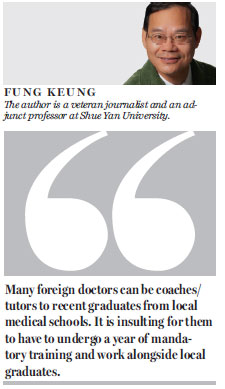HK must address its shortage of doctors
Updated: 2015-03-16 07:30
By Fung Keung(HK Edition)
|
|||||||
Government figures show Hong Kong residents generally have to wait two years to receive specialist medical services at government clinics or hospitals.
This doesn't sit well with Hong Kong's image as a rich, modern, efficient and caring city. With billions of dollars already in government reserves, why do people have to wait so long to receive medical treatment? Some die if their illnesses can't wait that long.
The answer is obvious: There is a chronic problem - a shortage of doctors. Increasingly the intake of medical students in local institutions, as health officials recently suggested, doesn't resolve the doctor shortage problem.
To tackle the shortage, Food and Health Bureau Secretary Ko Wing-man told local press on March 4 that the government planned to increase openings for medical students. The combined number of graduates produced by the medical schools at Hong Kong University and the Chinese University of Hong Kong will total 420 by 2018, up from 250 in 2014.
Ko admitted that the increased numbers of medical student intakes wouldn't resolve the shortage. "A shortage would persist over the years," he was quoted as saying. Money, meanwhile, doesn't seem to be the issue. This year the government's Hospital Authority (HA) funding will total HK$49 billion - up 50 percent from 2010.
At present, there are some 5,500 doctors working in the HA. In 2012, 2013 and 2014 the number of doctor vacancies in public hospitals was around 250, 310 and 340, respectively. There are currently 13 non-local doctors employed by the HA, who serve in the fields of anesthesia, emergency medicine, pathology, family medicine and internal medicine.
The low number of foreign doctors working in Hong Kong is pitiable, and worrying.
Currently, the Medical Council of Hong Kong may approve the registration of doctors who possess only qualifications for practicing medicine outside Hong Kong. After one year in Hong Kong, these overseas doctors need to pass an examination and undergo a year-long mandatory internship if they want to continue working in the city. Some overseas doctors are reluctant to become interns either because of the meager salaries or because they are already specialists in their hometowns. Some inevitably choose to return home.
Why experienced overseas doctors should be treated the same as local medical trainees (recruitment is conducted annually to recruit medical graduates of local universities and other qualified doctors fill the trainee-posts and for specialist training provided by the HA) is beyond me. Many overseas doctors can be coaches/tutors to recent graduates from local medical schools. It is insulting for them to have to undergo a year of mandatory training and work alongside local graduates. This partly explains why Hong Kong now has only 13 overseas doctors when it has 340 doctor vacancies.
To resolve the problem of a shortage of doctors in Hong Kong, experienced overseas doctors should be exempted from undergoing this humiliating year of "training". To draw an academic analogy, it is similar to asking me, a teacher of master's-level courses of eight years standing, to take the same courses as my students or my teaching contract will not be renewed. That would be absurd!
Dr Ko, I believe Hong Kong's medical professionals should be less "protectionist". For the benefit of Hong Kong citizens, more overseas doctors should be employed by the HA. As long as they have the training and experience required overseas, they should be allowed to practice in Hong Kong.
The thought of citizens having to wait two years before seeing a specialist, concerns me greatly.

(HK Edition 03/16/2015 page10)